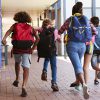Robert Slavin, PhD, is Director of the Center for Research and Reform in Education at Johns Hopkins University and is a co-founder of the Success for All Foundation. This essay first appeared in Robert Slavin’s blog.
If there is one educational benefit of the otherwise dismal experience of closing virtually all of America’s schools in response to the COVID-19 pandemic, it is this: I’ll bet parents are developing a lot of respect for teachers. I’m hearing a lot about parents finding out that online lessons are no substitute for capable, in-person teachers.
Because of the essential health need to reduce contacts among students and school personnel, schools all over the U.S. have closed. School leaders are scrambling to provide on-line coursework. It is difficult everywhere to go from zero to online in a very short time, but in schools in high-poverty areas, where many or most students lack home computers or reliable internet access, it is well-nigh impossible. But even if every student had a working computer and internet access, there seems to be widespread use of computerized worksheets, and other uninspiring content. In some schools and districts, in which online work is already well used and computers are universally available, the situation is surely better, but even there, online all day every day is no substitute for in-person teaching. Very conscientious and self-motivated students, the kind who already use Khan Academy just for fun, are probably thriving, but such students constitute a small minority, even in the finest schools.
School closures are likely to extend into May, leaving little if any of the regular school year for things to return to normal. Two states, Kansas and Virginia, have already announced that schools will not re-open before the end of the year, and others will surely follow.
The Summer Solution
In light of the realities we face, I think most schools are struggling to teach all of their children during the school closures. Parents are doing their best, as are some students, but nationwide, trying to keep schools going as they always have, except online, is not a satisfying solution.
I have an alternative solution. It has two simple steps.
- As soon as feasible, declare schools to be on break. Instant vacation.
- When it is safe to open schools, do so. Hold an in-person two-month session, starting (let’s say) on June 1 and running through the end of July.
During the instant vacation, provide parents and students with a menu of engaging activities that are fun, engage students’ energies and curiosity, and optional. These could focus on science, social studies, writing, art, music, and other subjects often given short shrift during the school year. These would be facilitated by teachers; in my experience, every school and district has many teachers who are crazy about one or more topics that they rarely get to talk about in school. Teachers may be Civil War reenactors, world travelers, art experts, amateur musicians, or published writers, even if those are not the topics they teach. In three days, max, any school district could find extraordinary people with fierce passions for something they want to share with kids. Students might be given a choice of activities, and they might choose to do none at all. It’s vacation, after all. The reason to have these activities is to give students shut in at home useful and interesting things to do. I’m sure there are loads of great online activities already out there that are rarely used because of the lack of time for such activities in the regular school year. Imagine any of the following, facilitated by teachers who love these topics:
- Online trips to faraway places or to periods of history
- Online book clubs in which students could choose topics they’d like to read about and then discuss age-appropriate books on them with others from all over their school, district, or state.
- Science clubs, in which students could explore topics of their choice in groups from all over. One interesting topic: epidemiology. Science clubs could find out everything there is to know about space travel, or the science of music, or the science of sports.
- Writer’s workshops, in which kids from all over could enroll in groups working on writing their own mystery stories, fantasy stories, sports stories, or biographies of famous people. That’s how the Bronte sisters learned to write, shut in in small-town Yorkshire, surrounded by poverty and disease. They wrote stories with and for each other, throughout their childhoods.
- Art or music appreciation, history, or techniques
- How students can get jobs and internships (in normal times)
- Post-secondary options for secondary students
I think you get the idea. Trying to cover all the usual school subjects in the usual way, but online, is sure to be boring and ineffective for most students. But on vacation, shut in students could select learning activities to do not for a grade, not under pressure from parents or teachers, but to satisfy their own curiosity.
When the crisis is over, presumably in the summer, students could return to school and resume their usual lessons, with in-person teachers. I’m sure there would be practical difficulties, but I’m willing to bet that this could work, perhaps in some places, perhaps in many. At least it seems worth a try!

